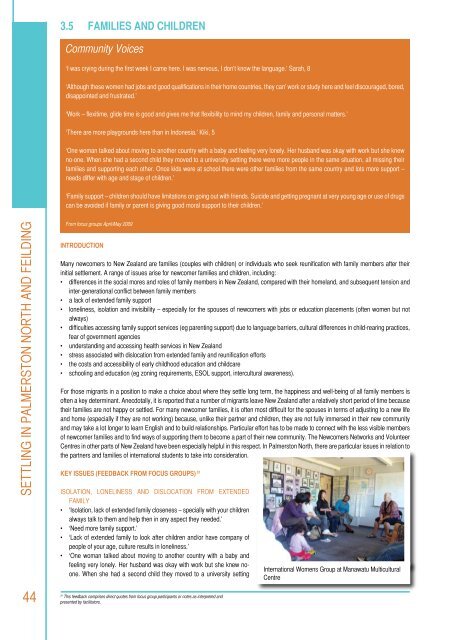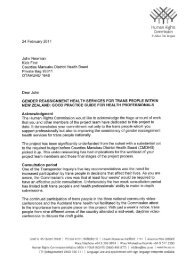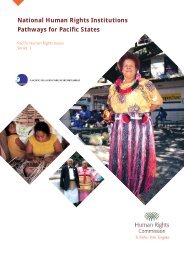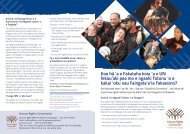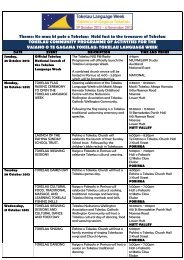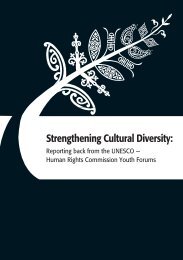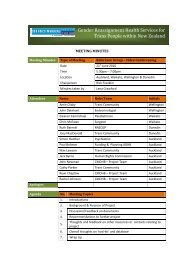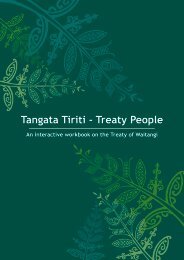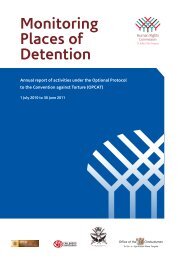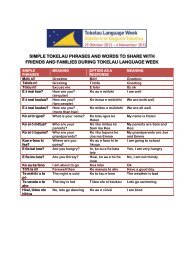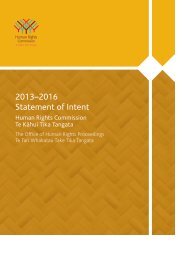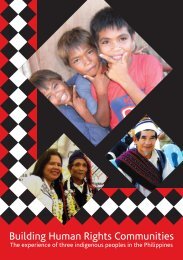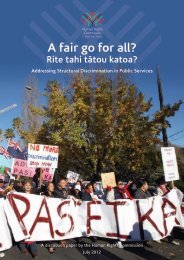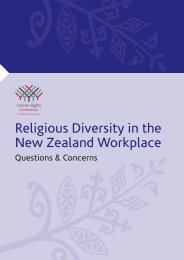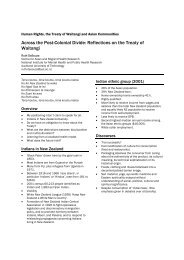Settling In Palmerston North and Feilding - Human Rights Commission
Settling In Palmerston North and Feilding - Human Rights Commission
Settling In Palmerston North and Feilding - Human Rights Commission
Create successful ePaper yourself
Turn your PDF publications into a flip-book with our unique Google optimized e-Paper software.
3.5 FAMILIES AND CHILDRENCommunity Voices‘I was crying during the first week I came here. I was nervous, I don’t know the language.’ Sarah, 8‘Although these women had jobs <strong>and</strong> good qualifications in their home countries, they can’ work or study here <strong>and</strong> feel discouraged, bored,disappointed <strong>and</strong> frustrated.’‘Work – flexitime, glide time is good <strong>and</strong> gives me that flexibility to mind my children, family <strong>and</strong> personal matters.’‘There are more playgrounds here than in <strong>In</strong>donesia.’ Kiki, 5‘One woman talked about moving to another country with a baby <strong>and</strong> feeling very lonely. Her husb<strong>and</strong> was okay with work but she knewno-one. When she had a second child they moved to a university setting there were more people in the same situation, all missing theirfamilies <strong>and</strong> supporting each other. Once kids were at school there were other families from the same country <strong>and</strong> lots more support –needs differ with age <strong>and</strong> stage of children.’‘Family support – children should have limitations on going out with friends. Suicide <strong>and</strong> getting pregnant at very young age or use of drugscan be avoided if family or parent is giving good moral support to their children.’SETTLING IN PALMERSTON NORTH AND FEILDING44From focus groups April/May 2009<strong>In</strong>troductionMany newcomers to New Zeal<strong>and</strong> are families (couples with children) or individuals who seek reunification with family members after theirinitial settlement. A range of issues arise for newcomer families <strong>and</strong> children, including:• differences in the social mores <strong>and</strong> roles of family members in New Zeal<strong>and</strong>, compared with their homel<strong>and</strong>, <strong>and</strong> subsequent tension <strong>and</strong>inter-generational conflict between family members• a lack of extended family support• loneliness, isolation <strong>and</strong> invisibility – especially for the spouses of newcomers with jobs or education placements (often women but notalways)• difficulties accessing family support services (eg parenting support) due to language barriers, cultural differences in child-rearing practices,fear of government agencies• underst<strong>and</strong>ing <strong>and</strong> accessing health services in New Zeal<strong>and</strong>• stress associated with dislocation from extended family <strong>and</strong> reunification efforts• the costs <strong>and</strong> accessibility of early childhood education <strong>and</strong> childcare• schooling <strong>and</strong> education (eg zoning requirements, ESOL support, intercultural awareness).For those migrants in a position to make a choice about where they settle long term, the happiness <strong>and</strong> well-being of all family members isoften a key determinant. Anecdotally, it is reported that a number of migrants leave New Zeal<strong>and</strong> after a relatively short period of time becausetheir families are not happy or settled. For many newcomer families, it is often most difficult for the spouses in terms of adjusting to a new life<strong>and</strong> home (especially if they are not working) because, unlike their partner <strong>and</strong> children, they are not fully immersed in their new community<strong>and</strong> may take a lot longer to learn English <strong>and</strong> to build relationships. Particular effort has to be made to connect with the less visible membersof newcomer families <strong>and</strong> to find ways of supporting them to become a part of their new community. The Newcomers Networks <strong>and</strong> VolunteerCentres in other parts of New Zeal<strong>and</strong> have been especially helpful in this respect. <strong>In</strong> <strong>Palmerston</strong> <strong>North</strong>, there are particular issues in relation tothe partners <strong>and</strong> families of international students to take into consideration.Key Issues (feedback from focus groups) 31Isolation, Loneliness <strong>and</strong> Dislocation from ExtendedFamily• ‘Isolation, lack of extended family closeness – specially with your childrenalways talk to them <strong>and</strong> help then in any aspect they needed.’• ‘Need more family support.’• ‘Lack of extended family to look after children <strong>and</strong>/or have company ofpeople of your age, culture results in loneliness.’• ‘One woman talked about moving to another country with a baby <strong>and</strong>feeling very lonely. Her husb<strong>and</strong> was okay with work but she knew noone.When she had a second child they moved to a university setting31This feedback comprises direct quotes from focus group participants or notes as interpreted <strong>and</strong>presented by facilitators.<strong>In</strong>ternational Womens Group at Manawatu MulticulturalCentre


